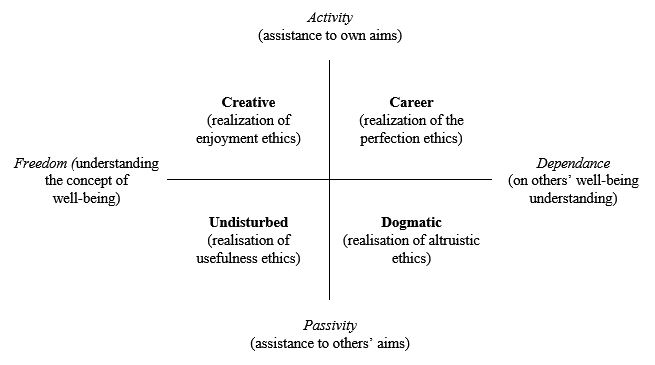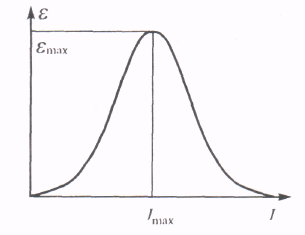Abstract
Since Francis Bacon coined the phrase "knowledge is power" in 1597, we have become acquainted with the concept. Knowledge is power is particularly true in the postindustrial society. Such a phenomenon as "high-tech" eliminates the distinction between scientific laboratory and manufacture. Nowadays, to be powerful means not only to be intelligent but also to be successful. Education systems are thus supposed to provide a person with knowledge that helps him to succeed. We think it will be productive to identify the boundaries of education systems that restrict their effectiveness. The information-synergetic approach enabled us to assess the effectiveness of the education systems.
Keywords: Education systemeffectivenesseducation paradigmpersonal valueslife purposeethical programmeboundaries of education systemswell-being
Introduction
Analyzing the appearance and development of pedagogical conceptions we came to the conclusion that all education systems are based on one of the ethical programmes. Moreover, ethical programmes, lying in the basis of education systems, let define the boundaries between these systems. These education environments were formed on different ideological bases, in different ethical systems, with different purposes, so, we can suppose that pedagogical technologies used in these environments must be different. We cannot say that one education system is better or worse than the other. As sociocultural systems need to fulfill all aspects of education, then educational systems co-exist with each other (Meighan & Toogood, 1992). It is important to preserve the objective boundaries between them.
In the paper, we aim to distinguish how in the existing variety of life-long purposes and inborn abilities people can get powerful and profound education. How to determine the moral limits of the power of knowledge? How to teach to use this power effectively for achieving noble aims?
Philosophy background of education
Education is the means by which the members of a society ensure that the behaviours and values necessary to maintain their culture are learned. (Pai, 2006) Understanding education as the process of socialization, which is purposefully oriented at some ideal images, at social etalons historically – fixed in the social conscience made us turn to anthropological research. We learned that pedagogical theories were created under the influence of philosophical ideas, precisely, as the result of philosophical understanding of an ideal human-being. The Antiquity, the Middle Ages, the New Time, being the unique epochs, created inside themselves educational paradigms that allowed them to reproduce themselves as stable cultural forms. So, during the humanity history several educational paradigms were created, each of them reflected the requirements of the corresponding epoch in the issues of formation of an ideal human-being etalon. Targeting at this ideal, the society determined the main purposes of education and up-bringing, which were to make a human-being better, finer, nobler and more perfect. The aims themselves confronted with the values of the society. As the result of this confrontation some of them took the leading position and determined the moral and mental determination of the given society.
Ethical criteria of education systems
During the whole history, there were elaborated several concepts of the proper life and the society well-being. In correspondence with these concepts several ways of the proper life were suggested, which people had to follow (Nuttal, 2007). In classical ethical systems the way to find a virtuous life was connected either with enjoyment, either with usefulness, and either with self-perfection and with mercy love. If we take that education is teaching "good" then we can apply Ruben G. Apressyan’s model (1995), which is called "the ethical square" (Table
The basic ethical principles – enjoyment, usefulness, personal perfection, and mercy love – appear at the crossing of two fundamental moral contradictions. The first is universalism vs particularism. It reflects two possible understandings of supreme values. We can consider them absolute, objective, taken for granted, constituting well-being for all –
The schematic character of the ethic square is compensated by the visibility of different forms of understanding of the ideal personality, which is created by the education. So, education, as the social institute can be based on different grounds. The shapes of these grounds can be seen in behavioral stereotypes. We want to stress that a concept important for our further discussion appears in this interpretation – it is the concept of aim (Table
This raises the difficult question of how far freedom of choice is restricted by ethical considerations. The personal aims and the ethical context of the education system determine where and how a person will educate him/herself.
To realize his right of choice two conditions are necessary. The first is the person must know what he/she wants? And the second – he/she must realize that he/she has a choice. That is why in order to get effective tools for achieving his/her life-long aims, a person should choose corresponding educational environment.
Axiological boundaries of education systems
Let’s investigate how the environment of the education systems is formed. To do this we need address to Yasvin’s model of education environments (Yasvin, 2001) and the types of educational atmosphere at home given by Yanusz Korczak (1919). We have combined the ethical square with the model of education environments in order to define the four types of the education systems and to distinguish the boundaries among them (Fig.1).

We state that any education environment has its limits (Melik-Haikazyan & Rogotneva, 2008). These limits divide the systems of effective achievement of certain aims. If we compare the models shown in pictures 1 and 2, we can characterize the limits. Activity is understood as realization of own aims. Passivity is assistance to others’ aims realization. Dependence is shown in understanding the well-being, the right life accourding to the incontestable authorities. The freedom is in the private choice of well-being understanding.
Common for further two education systems is their purpose to assist to the person’s success in the given circumstances that is to teach to win according to the rules which cannot be unchanged.
Effectiveness of education systems
Education has all the stages of informational process: it generates new information in the form of philosophical ideas about the ideal type of person. These ideas are fixed in pedagogical theories, that is, they are coded. Accourding to the set aim, the mechanism of formation of education system is created, the system is structured. Further, adequate means of the aim achievement are found, in other words, pedagogical technologies are developed. Behavioral model will show the type of personality which is formed in this system. So, we have proved that education systems are informational, and consequently, we have proved the relevancy of informational approach in researching of educational process.
All information systems have the most important characteristics – the effectiveness of information, which is equal to the derived function

During life a person can change his/her aims. If certain training is required for their achievement, than understanding of measure difference of information fields is important. In other words, to migrate successfully into different education systems it is necessary to be in those information zones where the values of effectiveness approach the maximum.
There are two sides of
Conclusion
We state, that the effectiveness of education depends not only on the quality of education, but on the axiological boundaries in which this quality is given. In other words, the quality of education is determined not only by received knowledge, skills, and abilities but, by the understanding of those meanings and values, for the sake of which they will be used. So, the boundaries of the effectiveness of education systems coincide with axiological boundaries of these systems.
Is it possible to value the effectiveness of education outside the axiological boundaries? If we talk about the effectiveness of the education system itself, it is possible. Nevertheless, the system should be aware of its aims and chooses the pedagogical technologies not at random choice. Migrations in education areas give an opportunity to choose effective ways of self-realization. Nowadays, the adjusting of transformation of boundaries of educational levels and systems is fulfilled only by quantitative results. It does not consider personal values, her life priorities. It is possible for a person to change the trajectory, but wandering among informational fields takes his priceless life-time. We insist on the fact that it is possible to pass through the educational levels in a certain order. If in a socio-cultural surrounding the intellectual maximum is determined by the creative education system, that is the requirements to the elite are very high, and a little of elite is required in the socio-cultural surrounding, than, the effective way is undisturbed system – dogmatic system – career system – creative system.
References
- Meighan , R., Toogood, P. (1992) Anatomy of Choice in Education. Education Now Books, 147 p.
- Pai, Y. (2006) Cultural Foundations of Education. Pearson Education, Inc., Upper Saddle River, New Jersey, 258 p.
- Nuttall, J. (2007) An Introduction to Philosophy. Polity Press, 254 p.
- Apressyan, R. (1995). The Idea of Morality. Moscow, Institute of Philosophy, 354 p.
- Yasvin, V.A. (2001) Obrazovatelnaya sreda : ot modelirovaniya k proektirovaniyu[ Educational environment: from modeling to engineering]. Moskow. Sense, 265 p.
- Korczak, Y. (2007) Loving Every Child: Wisdom for Parents. Algonquin Books, 84 p.
- Melik-Haikazjan, I.,Rogotneva, H. (2008) Love as Ethical Principle of Education. Construction of a Man: Reports of All-Russian scientific conference with international participation. Tomsk State Pedagogic University Press, pp. 64–68.
- Melik-Haikazyan, I.V. (1997) Information Processes and Reality. Physical and Mathematical Literature Publishing Company. Moscow, 192 p.
- Melik-Haikazyan, I., Rogotneva, E. (2008) Axiological Explanation of Educational Heterogeneity. Construction of a Man: Reports of All-Russian scientific conference with international participation. Tomsk State Pedagogic University Press, pp. 36–41.
Copyright information

This work is licensed under a Creative Commons Attribution-NonCommercial-NoDerivatives 4.0 International License.
About this article
Publication Date
20 February 2016
Article Doi
eBook ISBN
978-1-80296-006-8
Publisher
Future Academy
Volume
7
Print ISBN (optional)
-
Edition Number
1st Edition
Pages
1-513
Subjects
Social welfare, social services, personal health, public health
Cite this article as:
Rogotneva, E., & Demidova, O. (2016). The Role of Education in Person’s Life-long Goals Achieving. In F. Casati (Ed.), Lifelong Wellbeing in the World - WELLSO 2015, vol 7. European Proceedings of Social and Behavioural Sciences (pp. 245-251). Future Academy. https://doi.org/10.15405/epsbs.2016.02.33

